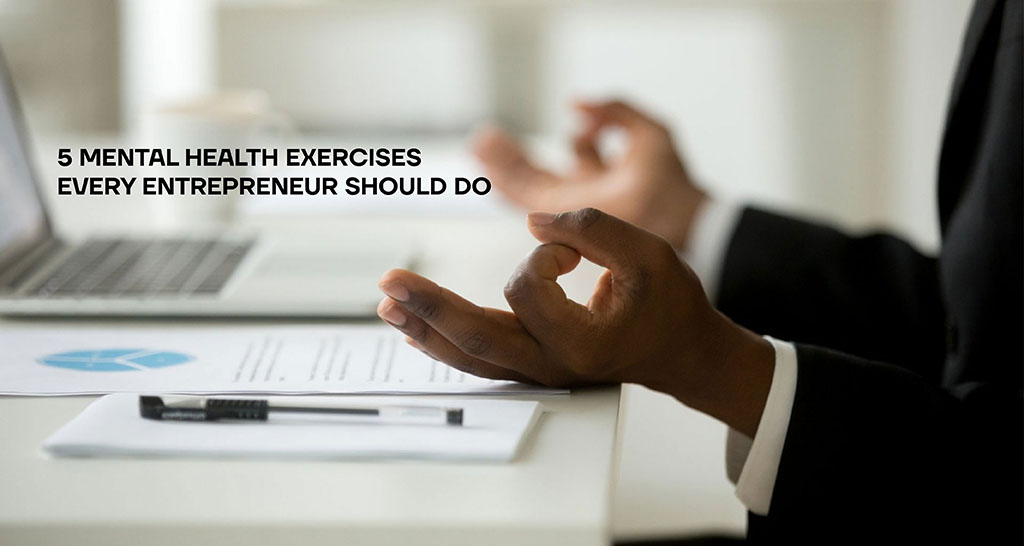Being an entrepreneur is one of the toughest tasks. Because it is not merely a job but a lifetime commitment that requires complete dedication. The outcome of being an entrepreneur can be amazing, but so can the consequences. The physical and mental health-related issues are one of them. Entrepreneurs suffer from more mental health difficulties than the common people. But you do need to leave your entrepreneurial dream to take care of your mental health; there is a solution—mental health Exercises.
Mental health workouts work like magic for entrepreneurs. We are all aware of the significance of physical health; exercising our minds often seems like an afterthought. But ignoring our mental health can result in numerous problems, including burnout, cognitive decline, or a reduction in the quality of life.
Here are 5 health exercises every entrepreneur should do to keep himself balanced as you move through the journey. Take this post as a workout plan for your mental health. The best part is that these mental health exercises do not need a lot of time or any special equipment. You just need to be committed to yourself for better mental and physical health.
Next, before we talk about these exercises, let’s quickly understand what it means by mental health exercises.
Mental Health Exercises: Comprehensive Overview
Mental health exercises are small but effective activities designed to empower your emotional core and take care of your mental health and cognitive muscles.
Mental health activities are not limited to just working on Sudoku puzzles. It focuses mainly on taking care of your emotional well-being. These activities help you to find and manage stress, anxiety, and negative thoughts that might affect your happiness or productivity.
Whether you wish to clear your mental landscape or build emotional resilience, check out these 5 mental health exercises tailored to help you reach them.
- Mindfulness
Mindfulness comes on top when it comes to mental health exercises. It is all about getting fully engaged with the present moment. In simple words, mindfulness is about being fully aware of your viewpoints, emotions, and sensations without judgment. The best part about mental health exercises is that you can practice mindfulness anywhere—at work while eating, or even during a conversation. For this, take a few minutes daily to sit quietly and focus on your breath. Next, pay attention to your thoughts and feelings without changing them. As time passes, it will make you more aware of your emotional triggers and thought patterns.
- Meditation
Meditation is the next level of mindfulness; it involves focused attention and mental stillness. It helps clear your mind of clutter, reduce anxiety, and achieve emotional balance. Meditation helps you get an escape from reality for a certain period and reduces stress.
For meditation, find a quiet space, sit, and keep your eyes closed. Stay focused on your breathing for 10 to 20 minutes. With each inhale and exhale, feel you are exhaling your stress and inhaling peace.
- Gratitude journaling
When you write your success and become thankful to God, it helps you redirect your focus from what’s lacking or stressful to what is positive in your life.
For gratitude journaling, write down three to four things you are thankful for. They can be simple and significant. It is not about avoiding your hurdles, but instead redirecting your attention from thoughts that cause distress to affirmations that improve your mental well-being.
- Breathing
Breathing exercise works like an immediate stress reliever. The good part is they are easy to do. They are excellent for your physical fitness.
When involved in the breathing exercise, sit comfortably and take a deep breath through your nose. Let your belly expand, hold on for a few seconds, and then exhale from your mouth. Do this to distract your thoughts from the stressor.
The breathing techniques include the 4-7-8, inhale through the nose for 4 seconds, hold the breath for 7 seconds, and exhale through the mouth for 8 seconds.
- Physical activity
Physical exercise helps in releasing chemicals in the brain that naturally uplift your mood. For physical wellbeing, you can do yoga, cycling, or even a brisk walk—aim for at least 30 minutes of physical activity every day.
In terms of mental health exercises, progressive muscle relaxation (PMR) can help you enhance brain health by practicing relaxation with the body. While there is some physical engagement, the focus is still on mental health. You tense and gradually release various muscle groups, from your toes to your head (or head to toes), relaxing further with each release.







